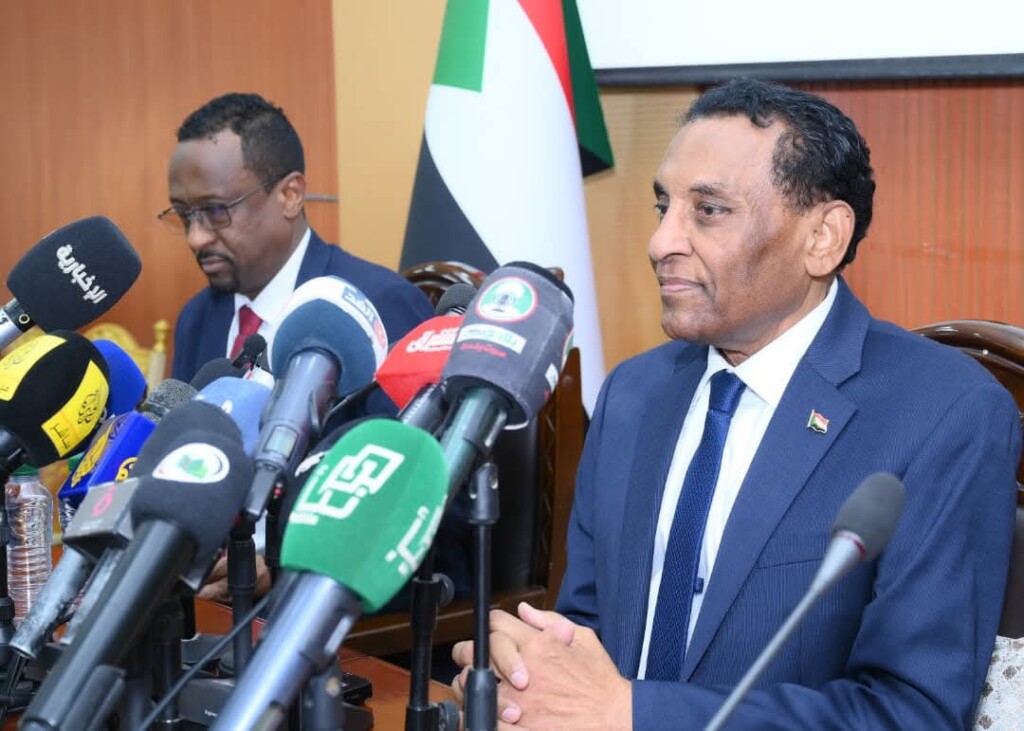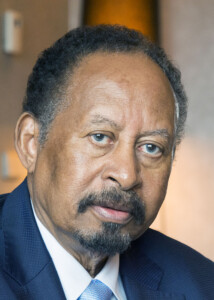Sudan PM unveils $100bn Saudi investment plan and GERD review

Sudan’s Prime Minister Dr Kamil El Tayeb Idris (right) with Minister of Culture and Information Khaled Aleiser (left) at a press conference in Port Sudan, 1 October 2025 (Photo: SUNA)
Sudan’s Prime Minister Kamil El Tayeb Idris has announced a $100 billion package of investment projects proposed to Saudi Arabia and a fresh review of the Grand Ethiopian Renaissance Dam (GERD) with Ethiopia and Egypt.
Speaking at a press conference in Port Sudan on Wednesday after returning from the UN General Assembly in New York, Idris said he presented 100 joint projects to Riyadh focused on the Red Sea’s untapped resources, which he argued could make Sudan and Saudi Arabia “among the richest countries in the world” if developed in partnership.
He also pledged a comprehensive reassessment of Sudan’s approach to the Nile dam dispute, emphasising direct diplomacy with both Cairo and Addis Ababa.
The Prime Minister added that recent floods in Sudan, which angered many Sudanese people, were widely believed to have resulted from the dam’s gates being opened. However, the Ministry of Agriculture attributed the flooding to heavy rains linked to climate change.
El Fasher siege
Idris said his top priorities in New York were lifting the siege on North Darfur’s capital of El Fasher and pressing for the pramilitary Rapid Support Forces (RSF) to be designated a terrorist group. He emphasised Sudan’s sovereignty, unity, and territorial integrity, adding that the international community responded positively to Khartoum’s position.
The Prime Minister revealed that UN Secretary-General António Guterres accepted his invitation to visit Sudan.
African Union return
Idris also declared that Sudan’s readmission to the African Union (AU) is “a matter of time”. He underlined the AU’s role as Sudan’s “real support”, noting that every country he met backed Sudan’s reintegration. The AU suspended Sudan’s membership following the October 2021 military coup.
US sanctions
Idris condemned the US State Department sanctions on Sudan as “unjust” and revealed they are currently under review following his meetings with American officials.
Washington imposed sanctions on Sudan over alleged use of chemical weapons, while also targeting commander-in-chief of the Sudanese Armed Forces, Lt Gen Abdelfattah El Burhan and RSF Commander Mohamed ‘Hemedti’ Dagalo.
The Prime Minister reiterated that decisions on humanitarian aid corridors remain a sovereign and security matter, stressing that state institutions must be involved to safeguard Sudan’s sovereignty.
‘No famine in Sudan’
Idris dismissed reports of famine in Sudan as “false”, insisting that international organisations and some media outlets are misrepresenting the situation.
Speaking at the weekly Ministry of Culture and Information platform in Port Sudan, he acknowledged severe hardship in besieged areas such as El Fasher but argued this does not amount to famine.
“The situation in Sudan cannot be described as famine,” Idris said. “There are areas under siege that require urgent international action to lift blockades, but Sudan has passed the stage of famine permanently. We will not allow anyone to revive this claim, and we have confronted these allegations firmly with evidence.”
His statement comes as numerous aid organisations, along with the Integrated Food Security Phase Classification (IPC), declared famine in five areas of North Darfur and Kordofan last December. Since then, Radio Dabanga has reported widespread malnutrition, with people resorting to eating ambaz (animal feed) to stave off hunger.
In January, the Sudanese Ministry of Foreign Affairs rejected the findings of the IPC report, claiming that they “do not reflect an objective and accurate description of the reality of food security in Sudan”, “ignore reliable scientific indicators” and “fail to follow agreements reached with Sudanese experts”, adding that the data used is outdated “as no field surveys have been conducted since 2022”.











 and then
and then